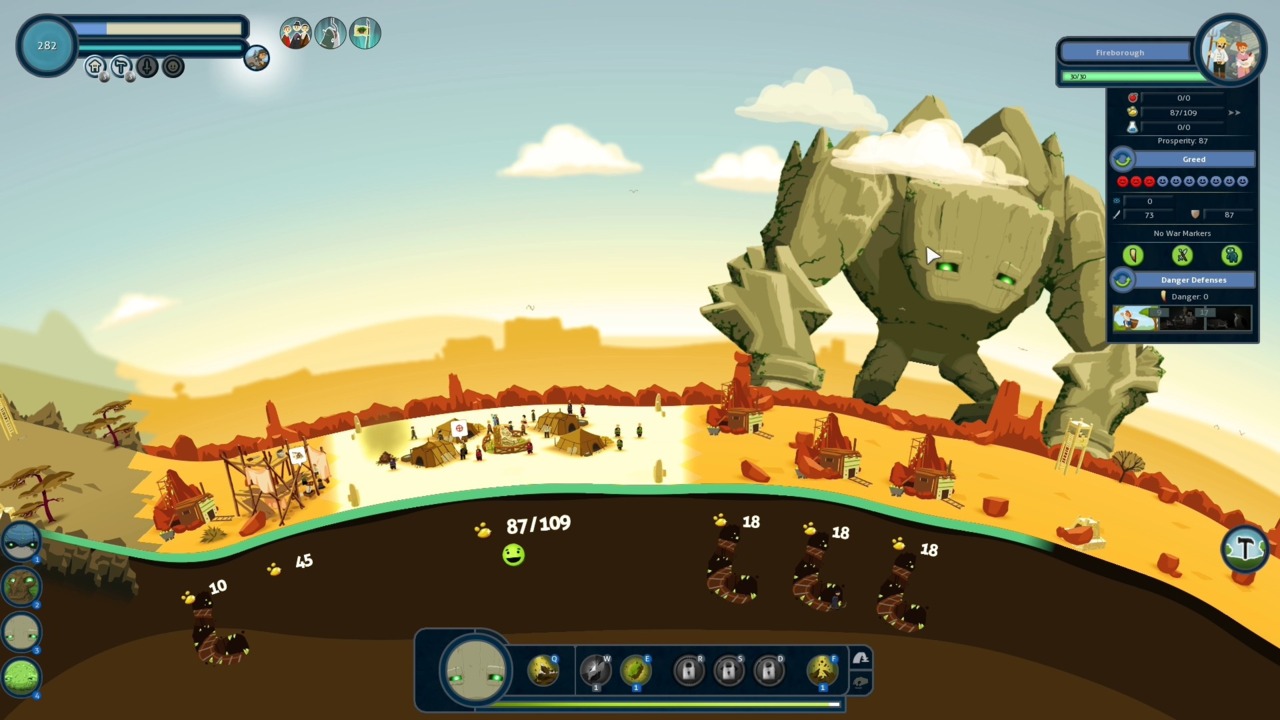Everything is connected. Oceans provide the water needed to give rise to swamps and forests. Fruit trees support nearby animals, making them more plentiful. The barren desert earth can conceal precious minerals underneath, just waiting for humans to come along and mine them. But the flourishing of a planet doesn't happen on its own. As the world itself, you guide the changes that take place on your surface. In Reus, you guide four elemental giants to and fro across the land, using their abilities to shape the planet and to support the fickle little humans who settle in the spaces you create for them. Though it initially appears quite simple, Reus gradually reveals itself to be a game of considerable complexity, and it makes the pursuit of a prosperous planet a thoroughly absorbing one.
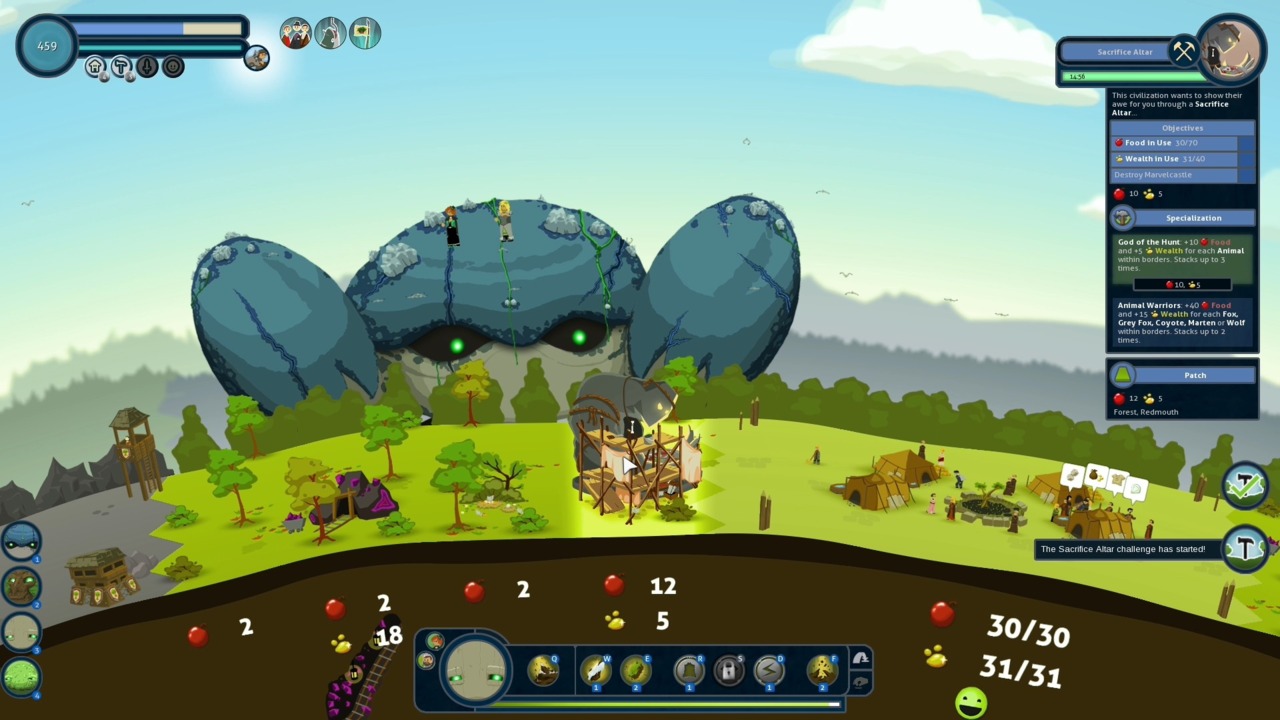
In Reus, the world is a two-dimensional circle. Each small patch of land can support only one thing, be it apple trees or rattlesnakes or topaz. You bequeath plants, animals, and minerals to these patches of land via the four giants who do your bidding; your forest giant's fruit plant ability can make blueberries spring up in the woodlands, for instance, while the ocean giant's domestic animals ability can make kangaroo rats appear in the desert. Once even the hint of what the game calls a "source"--any source of food, wealth, or technology--is in an area, humans will settle nearby. Before long, these strange creatures start trying to build projects. Schools, markets, a lair for the local mad scientist--you just never know what ideas will get into their kooky little heads.
The hapless little humans have no chance of succeeding at even their most modest endeavors without some divine intervention, but helping them achieve their early ambitions puts no strain on your godly abilities. You just need to pay a bit of attention to the specializations of projects and the symbioses of your resources. If a village is working on building a granary, for instance, that granary might have a specialization that results in a bonus of 15 food for every patch of land devoted to animals that is within the village's borders. This makes meeting the granary's completion requirement of 30 food in use by the village a snap.
Symbioses are benefits that sources get from neighboring or nearby sources; chickens are a better source of food if there are blueberries nearby to support them, for instance. This concept is simple yet meaningful, suggesting the interdependent relationships found in real ecosystems. Specializations and symbioses are the foundations for most of Reus' challenge, and the intuitiveness of these concepts makes it easy to grasp the all-important fundamentals before the game ratchets up the complexity.
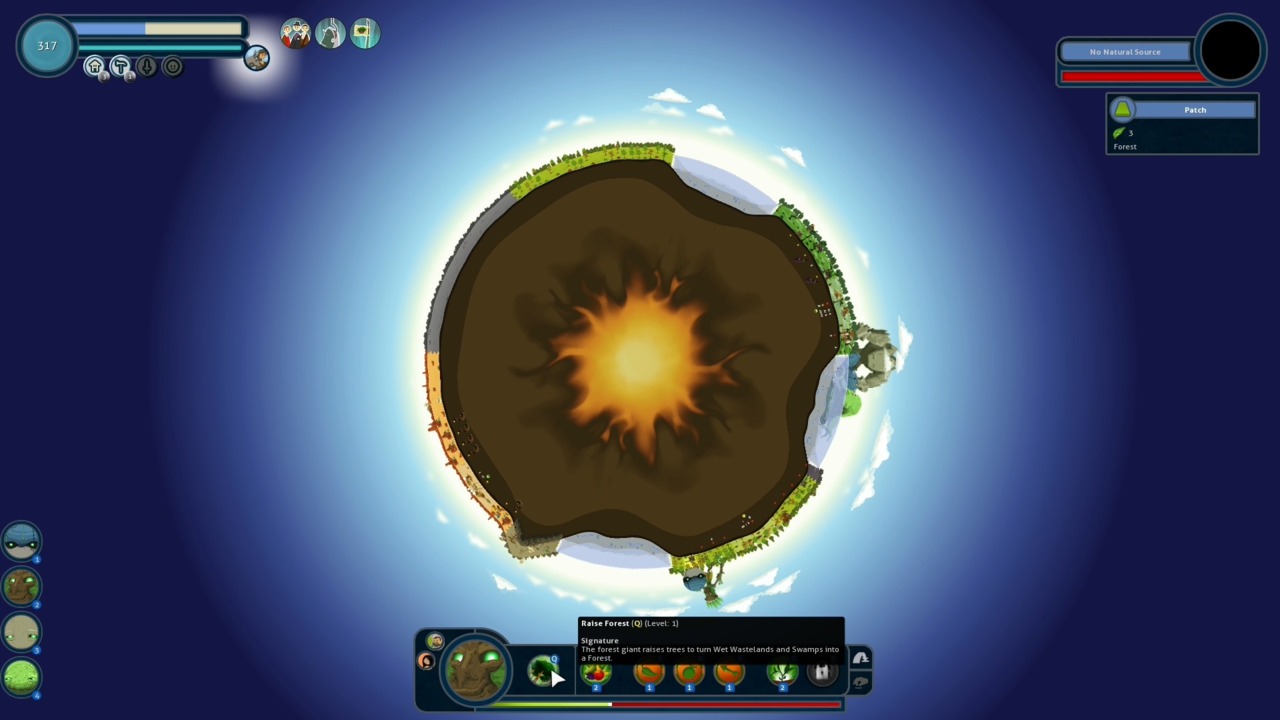
And ratchet up the complexity it does. After successfully creating a modest market, a rapidly growing town may try its hand at building a blast furnace, which has considerably loftier requirements. To help humans succeed at these more advanced endeavors, you need to create more advanced resources, which you do with the help of ambassadors the humans reward you with as thanks for helping them complete projects. When your giants have ambassadors riding on their shoulders, they gain access to a wider variety of abilities called aspects, which allow plants, animals, and minerals to be transmuted into more advanced sources.
Specializations also become more complex, requiring more thought and more work if you're going to take advantage of them the way you need to in order to help the humans complete their projects. You might find yourself in a situation where a village has just enough wealth to complete a project, but is just short of the amount of tech it needs, and you must rack your brain to work out a way to increase the village's tech without totally disrupting the delicate symbiotic balance you've established that is providing it with all that wealth. Problems like this can be delightfully exasperating, and if you work out a solution and see the humans complete the project before time runs out, you share in the jubilation as the little creatures celebrate their triumph.
The desires of humans can complicate your life in other ways, too. Give them too much too quickly, and they get greedy. If they get too greedy, they start trying to take what isn't theirs by waging war on other villages, and they sometimes even attack your giants, who can withstand a good deal of punishment but aren't invincible. There are numerous ways to try to keep greed in check. You can put some dangerous animals nearby so the villagers have more immediate concerns than planning for war, for instance, or you can place some sources that inspire awe in their vicinity.
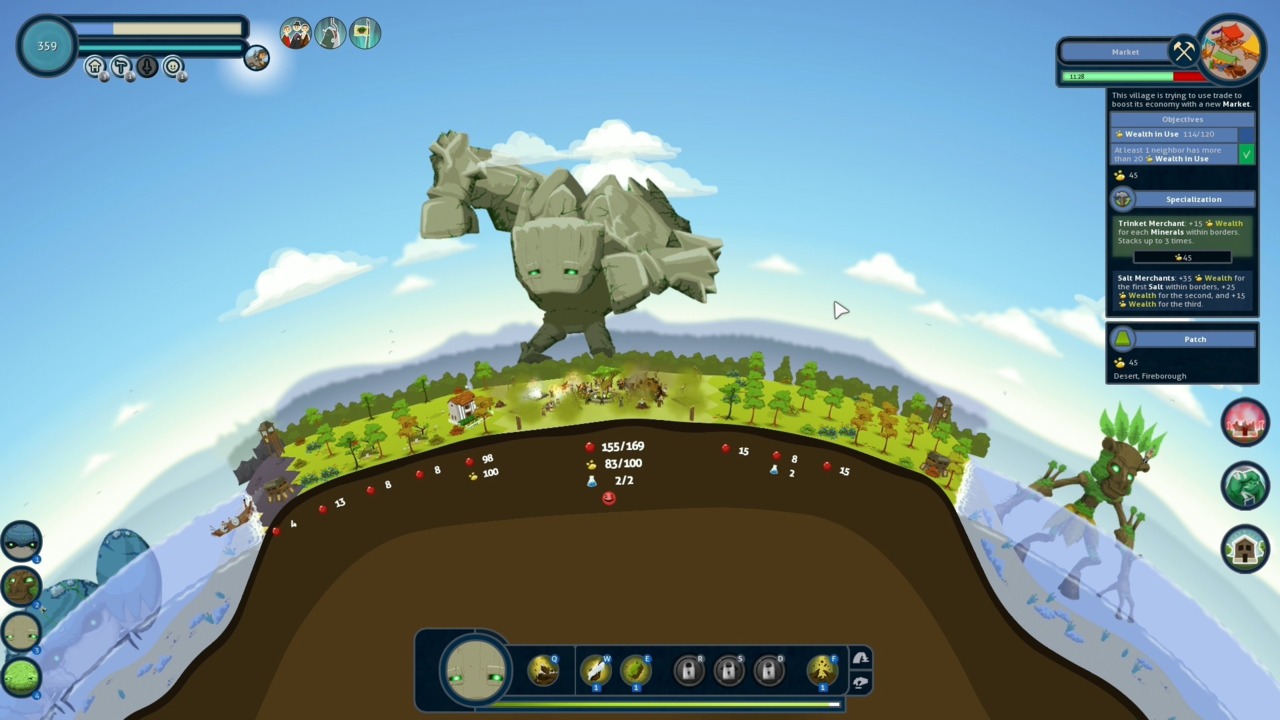
If the greed of some humans does get the better of them, you can let them wage war on (and possibly destroy) other villages; you can try to punish them into a state of humility; or you can always opt for a good old-fashioned smiting via your rock giant's mountain ability. On one hand, it can be disappointing to destroy everything you've worked to help your humans build. On the other, demonstrating your tremendous power and sending a clear, wrathful message about how foolish the humans were to behave the way they did can be morbidly satisfying.
Even though human nature sometimes reveals its uglier side in Reus, the game remains a welcoming experience. The giants are endearing, particularly the forest giant, whom you might see sneeze, sending forth an explosion of leaves. Zoom in on the world, and you can see humans tending to their villages and chatting with each other. The planet can be a diverse place, with villages in different environments displaying different styles of architecture and clothing. In a pious village that pursues projects like temples, you're likely to see residents in plain cloth robes, while the people of a wealthier, more materialistic town opt for more ornate attire. Villages continue to grow and evolve over time, making the world you've created feel alive and potentially bustling.
Time is always a concern in Reus. At first, you have access to games that take place over 30 minutes, and you might scramble to eke out every bit of prosperity you can from the planet right up to the final seconds when your giants return to their long slumber. By completing a certain number of challenges, you gain access to longer games during which humans attempt more advanced projects and which allow you to attempt to complete more difficult challenges. (You can also always play freeplay games, which last as long as you'd like, but in this mode you cannot complete challenges or unlock new sources.)
You might initially feel that the slowness with which your giants traverse the planet's surface drags the pace of the game down, but as you get better at the game and come to understand how the abilities of the various giants complement each other, your giants' movements become another welcome strategic consideration. Do you choose to focus on just a few villages, all within close proximity to each other? Do you cover the world in livable spaces, sacrificing time sending your giants to and fro as you try to bring as much prosperity as possible to each far-flung village?
The variety of challenges to complete gives you the incentive to try all kinds of approaches, and frees you to pursue those goals that are more interesting to you. You don't win or lose Reus; you just do the best you can each time, trying (or not trying at all) to complete as many or as few challenges as you like. You can just focus on creating a village that has a 250 prosperity score and only uses minerals, or you can attempt the challenge that requires you to have six villages with over 150 prosperity each.
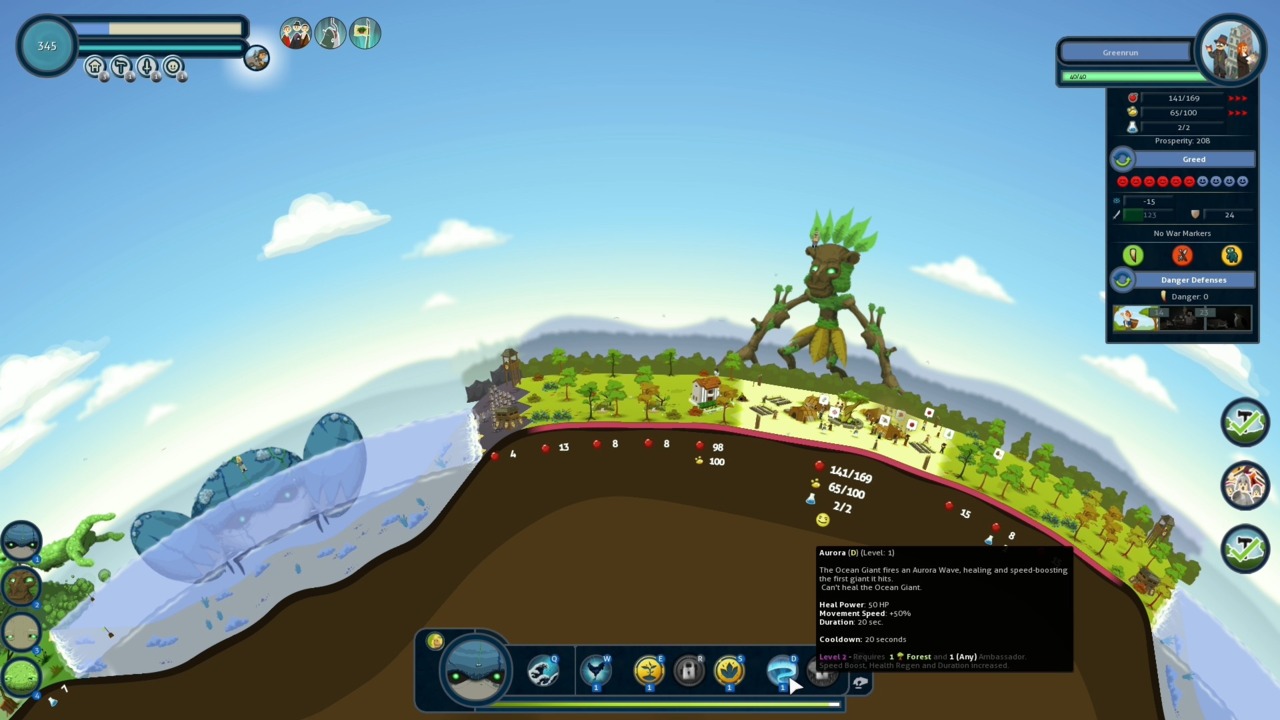
Different challenges require different approaches, and this keeps you coming back to Reus time and time again. You might hit a few awkward stages in your progression, though; especially when you first advance from one length of game to the next (from 30-minute games to hour-long games, for instance), humans may attempt projects that you can't adequately help them complete because you haven't yet unlocked the sources their specializations require.
Don't let the simplicity Reus exhibits at first glance fool you. Putting blueberries near chickens is basic enough, but starting from this fundamental concept of interconnected resources, Reus grows into a game that presents complex challenges, a great deal of flexibility, and the freedom to determine your own standards of success, or to simply enjoy experimenting with the landscape and toying with humans. It's good to be the planet.
